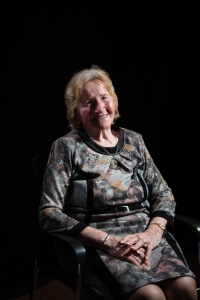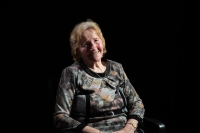I want them not to say that I was a bad person after my death

Stáhnout obrázek
Anna Blašková was born on January 23, 1934 in Chtelnica. Mother was originally from Chtelnica and father Ľudovít came from the nearby village of Dechtice. In addition to Anna, they raised seven more children. Anna spent the pre-war years and part of her childhood in Chtelnice, where everyone helped her grandparents in the fields. They mainly made a living by raising smaller farm animals and were able to grow basic food themselves. According to the witness, in 1941, Ľudovít‘s father unknowingly bought the store from the arizator, in which he did very well until the end of the war. After the war, he learned that the shop used to belong to Jews who were no longer alive, which he found very difficult. He had a mental breakdown and the family experienced a rather difficult time. It was Anna and her sister who brought him back to sewing, and he started doing well again. But since he refused to listen to the orders of the communists, he was taken to forced labor in the Karvina-Ostrava mines, while his mother and children were evicted from their house in Hlohovec to the village of Siladice, where they lived very modestly. After graduating from high school, Anna decided, despite her mother‘s disapproval, to continue her studies at the medical school in Nitra. In 1953, she became a registered nurse. During practice at the hospital in Nitra, she met her future husband, Juraj Topoľ, who came from the Czech Republic and was a very good gynecologist. Together they moved to Topoľčany, where the husband got the position of district gynecologist. Juraj‘s work as a doctor was extremely exhausting, due to which he got a severe flu, to which he succumbed in 1971. Anna was a widow for six years and raised her daughter alone. She later married her second husband, Ernest Blašek. After Juraj‘s death, she worked until her retirement in 1989 as a nurse in the physical education clinic.

